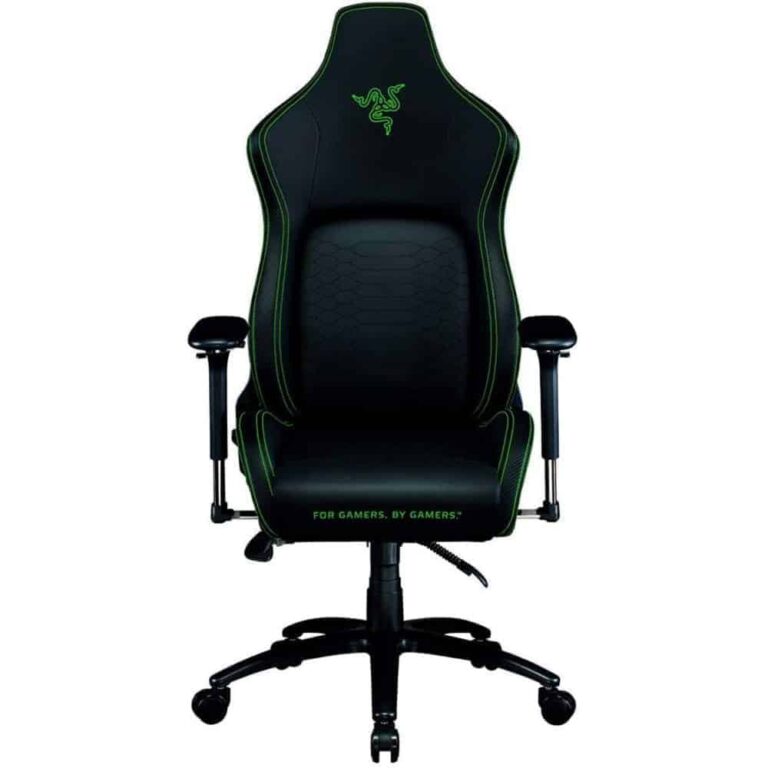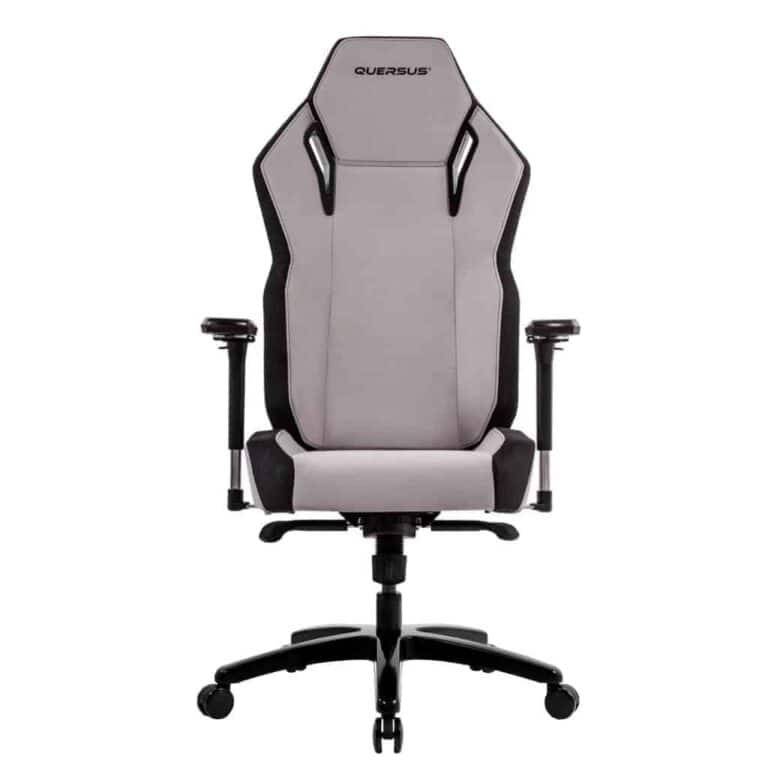Here is why you should trust me:
67+ chairs reviewed
4 years of experience
Honesty & Impartiality

Here is why you should trust me:
67+ chairs reviewed
4 years of experience
Honesty & Impartiality
Last updated on: November 23, 2024 at 04:05 PM
Ah… The Razer Iskur!
This was Razer’s first model, and since then they’ve come out with lots of others, including the Razer Enki, which has certain advantages, and certain shortcomings, compared to the Iskur.
If you’d like to know all about the differences between these models, I’ll mention them in the review, or I’ve provided brief summaries on my Razer gaming chairs comparison page.
The Razer Iskur promises to offer a comfortable chair with lasting comfort even for long gaming sessions, thanks in particular to its integrated, adjustable lumbar support.
But that’s not all… There are a whole host of other features that I’ll reveal later, but this is really one of the most important.
Razer’s strong point is clearly their attention to detail, the desire to always push the boundaries and create new things, all the time.
Let’s go a little off topic in the world of notebooks.
Who else but Razer has released a 16″ with a fully maximized config and a 120hz UHD mini-led? None other.
But that’s not to say that they’re flawless, and that their entry into the world of gaming chairs is necessarily a success.
If you’d like to find out, I highly recommend reading the rest of the review.
Sommaire

Right off the bat, I have to warn you that the Razer Iskur isn’t for every gamer.
That is to say, it’s a big investment, AND it has some advanced options that won’t do you any good if you play very little.
For example, if you play less than an hour a day, I’d recommend investing your budget in something else, and settling for a cheap gaming chair.
On the other hand, if you play around 3-5 hours a day, it’ll suit you perfectly.
However, if you spend more than 5 hours a day, I’d recommend you take a look at my comparison section, which will help you find a gaming chair to suit your gaming time.
Because, let me tell you, the Razer Iskur is very good, but what disappoints me for the price is the tilting mechanism, which isn’t really suited to long hours in a seated position… (I’ll tell you more in the tilt mechanism section of the review).
In terms of weight and height, you can get it if you’re under 136kg and between 1m70 and 1m80.
If you’re taller than that, you can always go for the Razer Iskur XL version, which is suitable for physiques from 1m80 to 2m08 for 180kg maximum.
Good points:
Negative points:
| 📅 Warranty:️ | 3 years |
| 🛻 Shipping: | Express |
| 👨 Support: | English |
| 🏋️♀️ Weight: | 30,3 kg |
The foam on the Razer Iskur is top-notch for seat and back durability.
Being very dense, it ensures that even after several hours of sitting and flattening the foam, it will always return to its original shape.
So a very good point for durability.
Secondly, the seat is medium-firm, just what you need to prevent it from being too soft and causing back pain.
If your doctor/physiotherapist hasn’t already told you, you should know that firm foam is ideal for combating and avoiding pain, as it provides better support.
The other advantage of the foam currently used is that it has been shaped to adapt to your body.
It’s not just foam that’s been laid down.
No, here it’s been designed to adapt to your body and therefore better distribute pressure points, ensuring you sit better and therefore more comfortably.
I really like it, and would expect nothing less from Razer.
However, where I see a very big flaw is that although they use “very dense” which means that the foam is at least high density…
Well, they didn’t specify the exact density, and I think that’s a bit of a shame. If someone from Razer comes by, don’t hesitate to let me know so I can add it!
On the Razer Iskur, unlike the Razer Enki which allows more freedom, the Razer Iskur has much more prominent side cheeks.
So, as everything here is a matter of preference, it’s for you if you like to be “held” in your seats.
This can have a number of advantages, for example if you tend to slouch, bend over or sit badly, I find that being held down helps you position yourself better.
At least until you get the hang of it!
If you ask me why…
I have no proof other than my own personal experience.
It’s just that when I’m maintained I feel a little more “blocked” and I avoid doing anything like putting my feet up on the desk when I go on youtube.
Which, as you can imagine (come on, I know I’m not the only one who’s done this, and still doing it, by the way!) results in a position that destroys your back in 20 minutes.
They’ve improved on this with the Razer Enki by introducing an off-center tilt mechanism…
But at this price, having a centered tilt mechanism doesn’t really strike me as top-notch.
It’s true that a very large proportion of gaming chairs have this type of rocker, but in these price ranges it’s becoming very rare.
If it had been a low-priced chair, I wouldn’t have said anything, it would have been normal, but I can’t find it here.
And for those who want to know what the advantages/disadvantages are.
For starters, a centered rocking mechanism is already better than a chair that doesn’t have one.
For example, your garden or dining chair is fixed.
This makes it suitable for short periods of sitting.
Because sitting in a fixed position means you’re always relying on the same muscles, which not only get tired, but also get expensive.
And the result?
You’ll find yourself slouching and sitting extremely awkwardly.
A centered rocking mechanism at least distributes the load better, allowing the chair and seat to follow your movements and rock according to how you move.
As a result, you use a variety of muscles, you can sit longer without adopting poor posture, and you’ll tire less quickly and are less likely to be in pain.
But compared to an off-center rocker, the centered rocker is still not perfect.
The centered rocker, since the rocking point is in the center, will cause your feet to lift off the ground during the rocking motion.
This isn’t great, and secondly, this type of rocker is less good for the circulation in your legs.
You could quickly feel the “heavy legs” effect, for example.
It’s also not great for your lower body, as it puts your hips in a very stretched position, which is bad.
That’s why an off-center tilting mechanism is already more suitable for long hours of play.
There are more, but this is a review on the Razer Iskur, not an article on all the different mechanisms haha!
This is currently the highest class in the world of pistons.
Class affects both the durability and solidity of the piston, so you’ll be fine.
And also on the power of the “spring”, the power that can be deployed to raise your chair, for example.
You might be saying to yourself, “Yes, he’s a chip off the old block”.
Yes, but not really, a chair with a class 3 jack can tend to rise with awful jerks that waste time as well as being disappointing.
So I think it’s important to make that clear.
For the frame (basically the skeleton of the chair, how it’s made under the foam, and under the upholstery) steel is pretty normal in that it’s very strong as well as being light.
I don’t think you’ve ever managed to break the frame of a chair, for example!
However, where it all often comes down to it is on the base of the chair, where you attach the castors.
There are often different materials to choose from: nylon, metal, aluminum and so on.
Each can withstand varying degrees of pressure.
Nylon is fairly basic, and found on entry-level/mid-range chairs, it will suffice for a good proportion of lightweight people.
Metal goes up a grade and supports pressures of several hundred kg, which is more than enough for almost everyone, and is present on mid/high-end chairs.
Aluminum, on the other hand, withstands pressures of around 1 tonne, which is absolutely enormous and only found on top-of-the-range chairs.
So, theoretically, a metal base will suffice without too many problems, but remember that aluminum is far more resistant and durable.
It’s no coincidence that Razer has decided to equip its Razer Enki with an aluminum base!
Here, on the other hand, it’s top of the line, with no better feature than 4-dimensional adjustable armrests.
Why is that good?
Because this is the chair that adapts to you, allowing you to :
As you can see, the armrests are fully adjustable.
There’s one thing I can’t fault about Razer gaming chairs, and that’s their iconic, unmistakable design.
In fact, it’s something that runs through all Razer products.
I don’t think I’ve ever seen a Razer object that wasn’t extremely aesthetically pleasing.
The great thing is that the Razer “green” contrasts really well with the black of the Iskur.
And the integrated lumbar support gives it a really distinctive, solid look, it’s original, I like it.
But what I really like best is the contrast between the stitching and the overall look of the seat.
It’s a bucket seat, but with really well-crafted, refined curves.
The coating used by Razer for the Iskur is a quality coating, more resistant and more durable than standard pu leather.
In plain English, this means that it will stand up well over time, and won’t crack (you see some seats that end up with bits of imitation leather peeling off and white everywhere?).
Fortunately with Razer, it’s quality and it won’t happen!
Secondly, I find synthetic leather practical for gamers who tend to eat/drink while at the office.
The advantage of synthetic leather is that it’s very easy to wash and clean, and hardly ever stains.
Unlike fabric, which is prone to staining, because fabric retains stains well.
On the other hand, if you tend to perspire, you might be better off with the Enki (which has velvet), because imitation tends to retain perspiration.
So you’re likely to end up with your back stuck to the seat.
On fabric, which is a much more breathable material, this is very rare.
It’s rare to have a memory foam headrest, because memory foam is expensive.
So I’m delighted to see that the Iskur has the same memory foam headrest as the Enki!
It’s great for taking care of your body and increasing your comfort.
The memory foam will distribute the various pressure points more evenly, increasing comfort and relieving stress.
Secondly, memory foam will improve your blood circulation, and the best part is that it adapts perfectly to your shape.
That’s why it’s a great advantage to have a memory foam cushion.
As for the lumbar support, it’s built-in, and unlike the Razer Enki, it’s adjustable!
And that’s the great advantage of the Iskur over the Enki.
I think it’s important to be able to adjust the depth of the lumbar support, because no two people are the same, and everyone needs different support.
It’s a great asset, and for the price I find it almost normal, and I was disappointed not to see it on the Enki.
Virtually all high-end gaming chairs at or near this price allow you to adjust at least the depth of the lumbar support…
I really like Razer too, because they’ve got that “luxury” look down to a fine art, and they take a lot of care in the manufacture of their seats and finishes.
The stitching is superb, solid, wide and even, pure Razer.
I have nothing to say about it except that it’s very well done.
The only small flaw, but it’s common to 99.99% of gaming chairs, is the plastic covers around the screws and so on.
The Razer Enki Pro doesn’t have these covers and is finished to a razor’s edge, but the price is also a razor’s edge.
The castors on the Razer Iskur are solid, and roll well on most floors, except that they struggle a little on carpets.
Otherwise, for me, the most important thing is that they don’t retain too much dust.
I’ve seen gaming chairs that were dust magnets before, but fortunately this isn’t the case.
This is a bit more basic, and I’m going to have to explain it in more ways than one.
On the one hand, it’s good because 130° is one of the best inclinations for a gaming chair (it’s the most relaxing and preserves the vertebrae the most) according to a study on Researchgate.
On the other hand, 139° will make it easy for you to find a sitting position, because 139° gives you a lot of freedom…
Well… There are plenty of chairs that go as far as 180°, which corresponds to a fully reclined position.
On the other hand, 180° is sometimes rather optional and gagdet, as people rarely use it.
However, 160° is still nice for taking short breaks or naps, or watching a stream in peace and quiet.
So an angle approaching that of the Enki would have been much more appreciable.
And now that you’ve read most of the review, you’ve probably realized that the Enki is basically an improved version of the Iskur they first tried!
The height of each armrest can be adjusted using the knob on the outside of each armrest.
Width can be adjusted using the internal knob on each armrest.
Other armrest adjustments are made by simply moving the armrests.
Backrest inclination is adjusted using a lever on the right-hand side of the seat.
Finally, the seat’s other adjustments are located underneath the seat.
You don’t have to be a DIY enthusiast or a gaming chair assembly artist.
It won’t take you more than 20 minutes to assemble the Razer Iskur, and that’s if you take your time and include unpacking!
Everything is clearly explained, accessories are supplied and some screws are already screwed in.
Clearly, other users’ opinions of the Razer Iskur are flourishing.
And understandably so: who wouldn’t want to try out Razer’s little first?
Overall, here’s what others like about it:
On the other hand, I’ve seen a lot of warnings about the size: if you’re over 1m80, you’d better get the XL version.
Otherwise, you’re likely to be very tight in the “normal” version of the Iskur!

The latest Secretlab, because in addition to offering 4D armrests, a backrest that reclines up to 165°, an off-center tilt mechanism and integrated lumbar support adjustable for both height AND volume, is quite reasonably priced.
I can therefore recommend it with my eyes closed, Secretlab being one of the Razer’s competitors.
Read my ranking of Secretlab gaming chairs.

Then there are the Quersus Vaos/Evos/Geos models I compared, which also feature 4D armrests, a high-quality tilt mechanism and a backrest that reclines up to 140°.
The Quersus also has a few shortcomings compared with the Razer Iskur, for example the headrests are not memory foam, but the price is very, very attractive.
Read my ranking of Quersus gaming chairs.

And… How can you not use the Razer Enki?
The armrests of the Enki are also in 4D, but the tilt is a little more permissive, as it goes up to 152°. Both have a memory cushion, but the Enki has an off-center tilt mechanism, which is much better, BUT no integrated lumbar support.
So, both have their advantages and shortcomings, and in my opinion, are suitable for different types of gamer.
Read my review of the Razer Enki.
If you’ve read this far, I’m sure you’ve realized that choosing a gaming chair isn’t as easy as it sounds.
And also how choosing the right one can have a major impact on your comfort, especially when you’re spending long hours gaming.
So if the Razer Iskur ticks all the boxes for you, I recommend you click on the button below to be redirected to a trusted site where you can proceed to purchase.

Thomas is the creator/editor of this site. A very passionate gamer since his early childhood, his mission is to help you choose an important part of your set-up: the gaming chair.